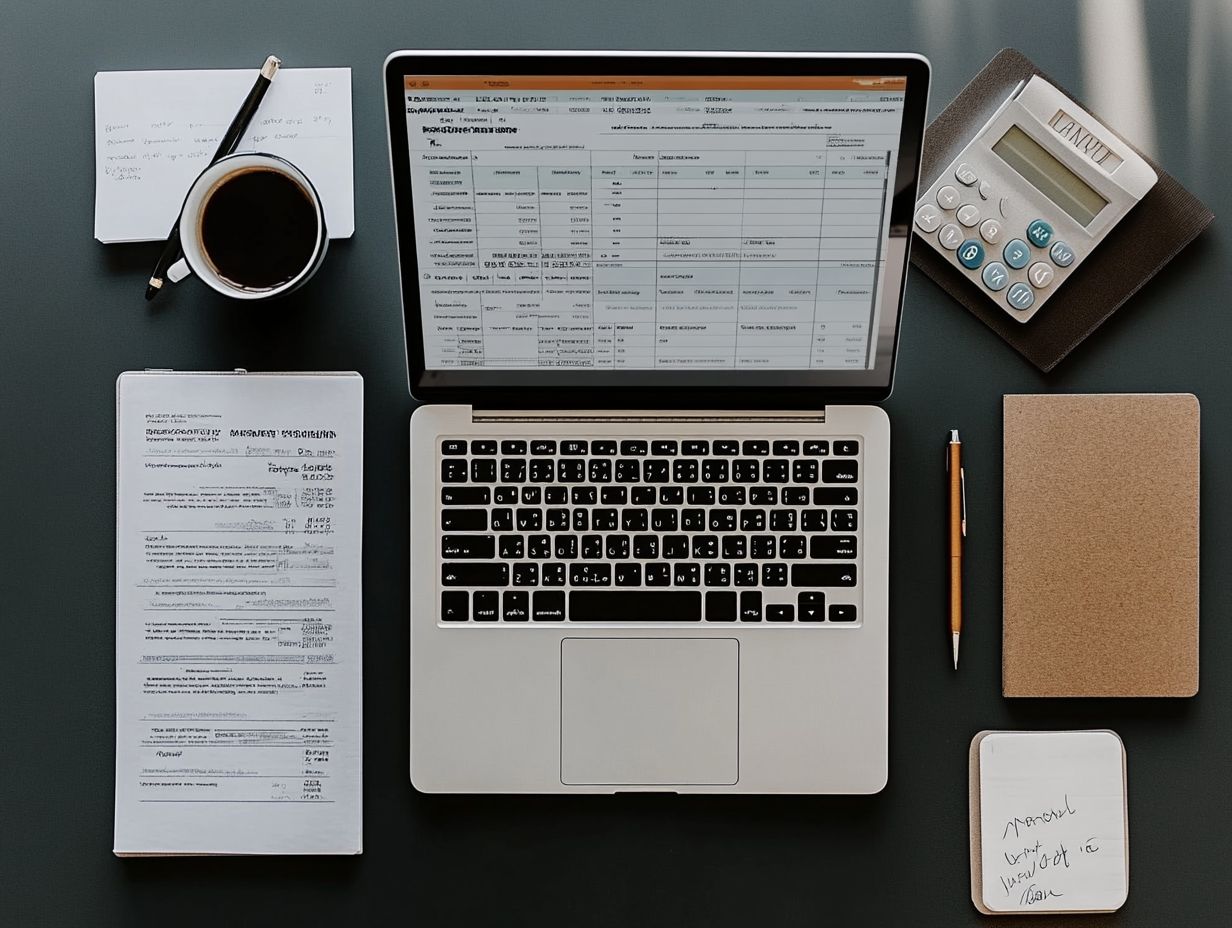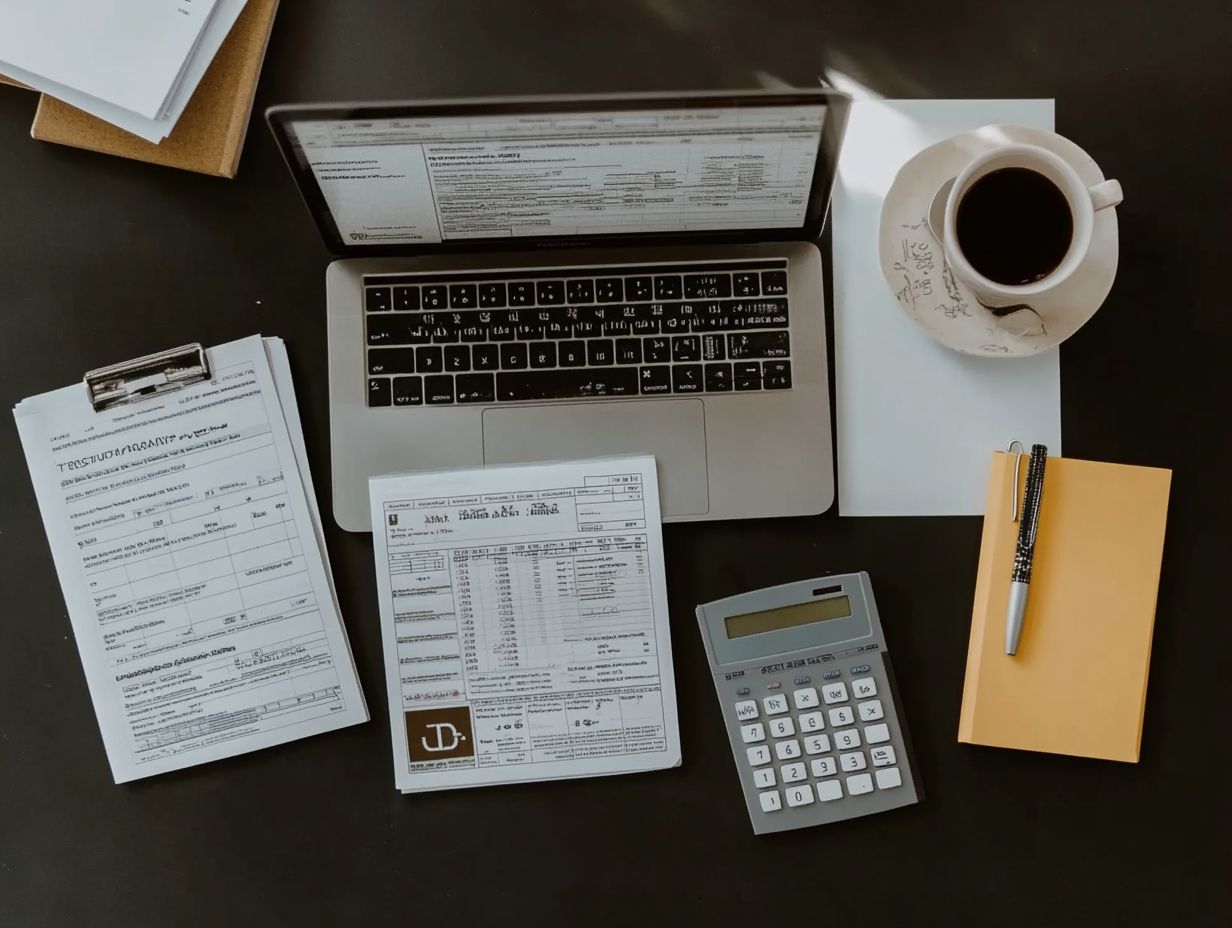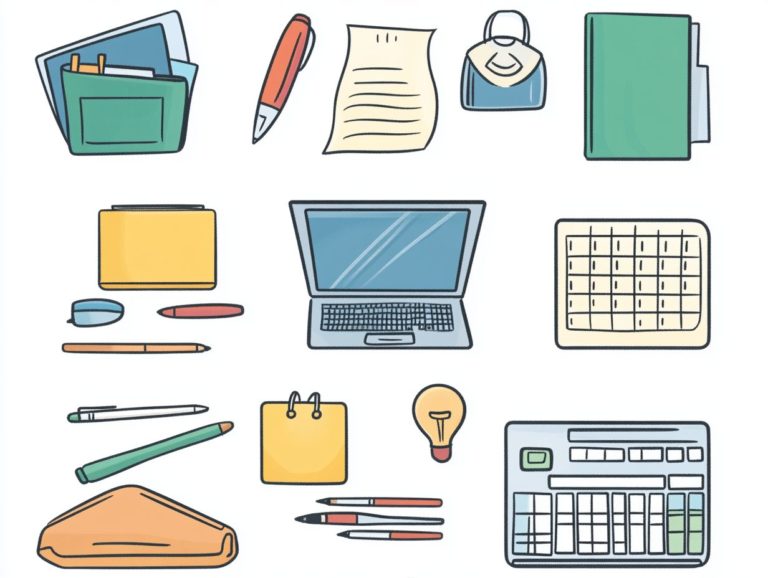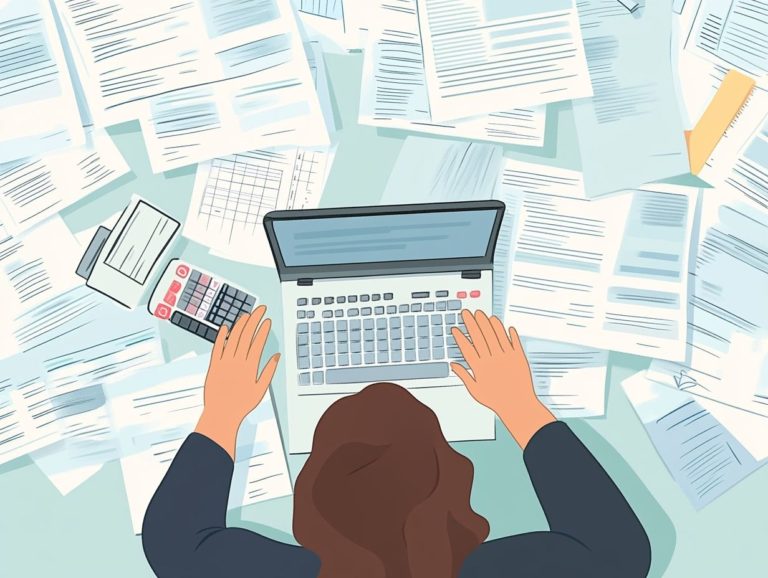How to Handle Taxes for Freelance Projects
Navigating the world of taxes as a freelancer can indeed feel daunting. However, grasping your responsibilities can set you on the path to financial success.
This article breaks down essential concepts, highlighting the critical differences between employee and freelancer taxes, as well as the common deductions you can legitimately claim.
You ll discover best practices for keeping your finances organized, important deadlines for filing, and effective strategies for managing your estimated taxes.
With valuable insights sprinkled throughout, you ll emerge more confident in maximizing your savings while ensuring compliance. Dive in and transform tax season into a smooth experience!
Contents
- Key Takeaways:
- Understanding Taxes for Freelancers
- Common Tax Deductions for Freelancers
- Keeping Track of Finances
- Filing Taxes as a Freelancer
- Managing Estimated Taxes
- Tax Tips for Freelancers
- Frequently Asked Questions
- What are the tax implications of working on freelance projects related to self-employment?
- Do I need to file taxes for my freelance projects?
- Can I deduct any expenses related to my freelance projects?
- What is estimated tax and do I need to pay it for my freelance projects?
- Are there any tax breaks or deductions specifically for freelancers?
- How can I stay organized and prepared for tax season as a freelancer?
Key Takeaways:

- Freelancers need to understand the difference between employee and freelancer taxes to accurately file their taxes and avoid potential penalties.
- Keeping track of finances is crucial for freelancers. Knowing which expenses can be written off can help minimize their tax burden.
- Filing taxes as a freelancer can be complex. Knowing important deadlines and forms can help simplify the process.
Understanding Taxes for Freelancers
Understanding taxes as a freelancer is essential for managing the challenges of earning money on your own while ensuring compliance with IRS regulations. Unlike traditional employees, you carry the weight of reporting your earnings and paying estimated taxes quarterly a task that can feel overwhelming without the right knowledge.
You should understand various legal structures, like LLCs and S corporations. These can help optimize your tax liabilities. You also need to know the specific deductions and credits you can claim on forms like the 1099-MISC and Schedule C.
This shows how important it is to keep accurate accounting records and utilize the right software tools to make your life easier.
Difference between Employee and Freelancer Taxes
The key difference between employee taxes and freelancer taxes primarily hinges on how you report and pay your income. As an employee, your taxes are conveniently withheld from your paycheck by your employer. In contrast, as a freelancer, you must calculate and pay your taxes directly to the IRS through estimated quarterly payments.
This means you’ll receive a 1099 form instead of a W-2, and you’ll need to file a Schedule C to report your business income and expenses. Grasping these distinctions is crucial for you to avoid penalties and ensure your tax filings are spot on. For more detailed guidance, check out these tax tips for freelancers in the gig economy.
Freelancers face unique tax obligations. Without proper management, these can feel overwhelming. You re responsible for self-employment tax, which includes both Social Security and Medicare taxes something traditional employees don t have to juggle on their own.
Common pitfalls include underestimating your taxable income or neglecting deductible business expenses, leading to paying more taxes than necessary.
To stay compliant and optimize your tax filings, maintaining detailed records of your income and expenses is essential. Utilizing accounting software can also be a game-changer. Consulting a tax professional who understands self-employment taxation will help you navigate the ins and outs of tax forms.
By adopting these practices, you not only streamline the process but also alleviate potential stress when tax season rolls around.
Common Tax Deductions for Freelancers
Familiarity with common tax deductions is essential for freelancers. Understanding these deductions can unlock significant savings! You can save money by deducting various expenses tied to your self-employment, such as home office costs (including utilities and rent), business supplies, and professional services.
Understanding these deductions can help you maximize your savings while ensuring you remain compliant with IRS regulations. By leveraging accounting software, you can simplify the expense-tracking process, enabling you to concentrate on growing your business while maintaining an organized approach and being well-prepared for tax season.
Start organizing your finances today to make next tax season a breeze!
Expenses You Can Write Off
As a freelancer, you can take advantage of numerous work expenses that can significantly lower your overall tax amount you owe. It’s essential to understand what qualifies. Common write-offs include home office expenses, supplies, software subscriptions, and even a portion of your internet and phone bills if they’re used for business.
The IRS allows these deductions to support self-employed individuals in managing their operational costs, but proper documents are key to validating these expenses when tax time rolls around. Utilizing reliable accounting software can make this process much smoother.
Beyond these primary deductions, you can also claim travel costs, including mileage for business-related trips and accommodation expenses when working away from home. Marketing costs, such as website hosting and online advertising, can yield substantial deductions as well.
It s crucial to classify your expenses correctly and keep detailed receipts to ensure compliance with tax regulations. Consulting with an accountant can help you optimize your tax strategies and guide you through the complex rules, maximizing your deductions while minimizing the risk of audits.
Keeping Track of Finances

Keeping track of your finances is essential as a freelancer. This ensures accurate tax reporting and maintains your financial well-being. Given the distinct nature of self-employment, you need to be meticulous in recording every bit of income and expense to avoid any discrepancies that might catch the IRS’s eye.
Utilizing accounting software simplifies this task, enabling you to track payments and deductions efficiently. It also offers valuable insights into your business performance.
Establishing a routine for financial record-keeping reduces stress during tax season, ensuring that nothing slips through the cracks.
Best Practices for Record-Keeping
Best practices for record-keeping are crucial for freelancers. They enable you to maintain organized finances and prepare effectively for tax season. Establishing a consistent method for documenting your income and expenses helps you catch potential deductions and ensure accurate reporting to the IRS.
Here are common strategies you can use:
- Maintain digital receipts
- Categorize your expenses
- Regularly update your accounting software to reflect your real-time financial status
By adopting these practices, you can alleviate the stress of tax preparation while enhancing your financial management skills. For specific guidance, check out this resource on how to handle tax payments for contract jobs.
To streamline this process, consider using dedicated accounting software that automates many tasks involved in financial tracking. With features like expense categorization, invoice generation, and transaction reconciliation, these tools save you time and minimize the risk of human error.
A systematic approach to managing your finances can reveal valuable insights into your spending habits. This enables you to make better financial decisions in the future. By embracing digital solutions, you can maximize your allowable deductions and maintain impeccable financial order setting yourself up for greater financial success.
Filing Taxes as a Freelancer
Filing taxes as a freelancer requires you to grasp several essential components, including the necessary forms and the deadlines you must meet. Unlike traditional employees, you will need to file a Schedule C, which is used to report income or loss from a business, to report your business income and expenses. You’ll often receive a 1099 form instead of a W-2.
Being mindful of important deadlines throughout the tax year is crucial. This helps you avoid penalties and ensure your submissions are timely. Important dates include the due dates for estimated tax payments, which typically occur quarterly, presenting unique challenges for freelancers who manage their own finances. Understanding the importance of keeping tax records for freelancers can also greatly enhance your financial management.
Important Deadlines and Forms to Know
Are you ready to take control of your freelance taxes? For freelancers, understanding the crucial deadlines and required forms for tax filing is essential for staying compliant and sidestepping penalties. Key forms to be aware of include the 1099-MISC, a form for reporting payments you receive as a freelancer, and the Schedule C, which details income and expenses from self-employment.
Stay alert to critical deadlines for estimated tax payments throughout the year, which typically fall on the 15th of April, June, September, and January. By mastering these timelines, you position yourself to remain in good standing with IRS regulations.
The 1040 form is your ticket for filing the annual income tax return, and it must be submitted by April 15th. Missing these deadlines can lead to unwelcome penalties or interest charges on unpaid taxes, potentially creating significant financial strain.
To avoid these pitfalls, create a calendar to track important dates and set reminders well in advance. Organizing your records of income and expenses throughout the year can streamline the filing process, ultimately paving the way for a more stress-free tax season. For additional guidance, check out these 5 essential tax tips for creative freelancers.
Managing Estimated Taxes
Managing estimated taxes is a crucial element of financial planning for freelancers, as you bear the responsibility of calculating and paying your own taxes throughout the year. Unlike employees, who enjoy the convenience of having taxes withheld from their paychecks, you must make quarterly payments to the IRS based on your anticipated income.
This can feel overwhelming without the right planning. Planning ahead makes this process easier. By familiarizing yourself with your income streams and potential deductions, you can handle your estimated tax payments with confidence. For freelancers, understanding navigating quarterly taxes can effectively minimize the risk of underpayment penalties on your 1099-MISC or 1099-NEC.
Calculating and Paying Quarterly Taxes

Calculating and paying quarterly taxes is crucial for you as a freelancer to remain compliant with IRS regulations and steer clear of penalties. You’ll need to estimate your income for the year and break it down into quarterly payments, ensuring you address both your income tax and self-employment tax obligations, which is the tax you pay on income earned from freelance work.
Use accounting software to simplify your calculations and send you reminders for payment deadlines. By proactively managing your quarterly taxes, you can uphold financial stability and learn how to estimate your taxes as a freelancer, helping you avoid those frantic last-minute scrambles come tax season.
A smart approach to estimating your tax payments is to review your previous year’s income as a benchmark. This historical data serves as a valuable guide for projecting your current year s earnings, allowing you to make adjustments for any expected changes.
Remember, underestimating your tax payments can lead to steep penalties, so it’s wise to save a percentage of your earnings regularly. By diligently setting aside funds into a dedicated tax fund, you can ease the financial strain when those tax payments are due. For freelancers, learning how to save for taxes can pave the way for a healthier financial outlook.
Tax Tips for Freelancers
Tax tips for freelancers offer invaluable insights into maximizing deductions and optimizing savings, essential elements for maintaining a robust financial outlook. As a freelancer, you encounter unique expenses that are often deductible, yet many overlook these potential savings opportunities, including tax credits available for self-employment.
Embrace accounting software to simplify the process of tracking expenses and filing taxes. Consulting with tax experts can reveal lesser-known deductions that could benefit you substantially.
By staying informed about tax changes and strategically planning your finances with the help of professionals like Josh Zimmelman or Westwood Tax & Consulting, you can significantly enhance your bottom line and secure your financial future.
Don’t wait until the last minute start organizing your tax documents today! Take charge of your tax situation and secure your financial future!
Expert Advice for Maximizing Deductions and Savings
Expert advice on maximizing deductions and savings is invaluable for freelancers. Navigating the complexities of tax law requires a specialized understanding that can be challenging to master.
Consider this: you might easily overlook deductions for home office space, equipment purchases, or even travel expenses tied to client meetings. Take a graphic designer, for instance, who frequently travels for consultations. By keeping meticulous records of their travel expenses, including 1099 income reporting, they unlocked significant savings and gained clarity on their tax situation. For freelancers, knowing how to handle tax audits can also be crucial in managing these deductions effectively.
Choosing an LLC structure can protect your personal assets while offering tax flexibility. This setup allows for pass-through taxation, a way for business owners to report income directly on their personal tax returns. Engaging with a tax professional keeps you informed about the latest tax regulations and ensures you’re taking full advantage of every opportunity to minimize your tax burden. Additionally, it’s important to understand what to know about sales tax as a freelancer to stay compliant.
Frequently Asked Questions
Any income earned from freelance projects is considered self-employment income and is subject to taxes. You will be responsible for paying both income taxes and self-employment taxes on your freelance income.
Do I need to file taxes for my freelance projects?
Yes, as a self-employed individual, you are required to file a tax return using Schedule C if your net income from freelance projects exceeds $400 in a year. Keeping track of all your income and expenses related to your freelance work for accurate tax reporting is crucial for maximizing your savings! To avoid common pitfalls, consider learning about the top tax mistakes freelancers make.
Yes, as a self-employed individual, you can deduct any legitimate business expenses incurred while working on freelance projects. This includes expenses such as home office expenses, equipment and supplies, and business travel expenses, which can be reported on your 1099.
What is estimated tax and do I need to pay it for my freelance projects?
Estimated tax is a method of paying income tax on income that is not subject to withholding. As a freelancer, you may need to make quarterly estimated tax payments if you expect to owe more than $1,000 in taxes for the year. Calculating and paying your estimated tax helps avoid penalties and interest.
Are there any tax breaks or deductions specifically for freelancers?
Yes, there are several tax breaks and deductions available to self-employed individuals. These include deductions for health insurance premiums, retirement plan contributions, and the home office deduction. Consulting with a tax professional helps you properly claim these deductions and maximize your savings.
How can I stay organized and prepared for tax season as a freelancer?
To stay organized and prepared for tax season, you should keep detailed records of all your income and expenses related to your freelance projects. Consider using accounting software like Expensify or hiring a tax professional to help you keep track of your financials. Make sure to set aside a portion of your income for taxes throughout the year to avoid financial strain during tax season.
Start organizing your finances today to save big on your taxes!







